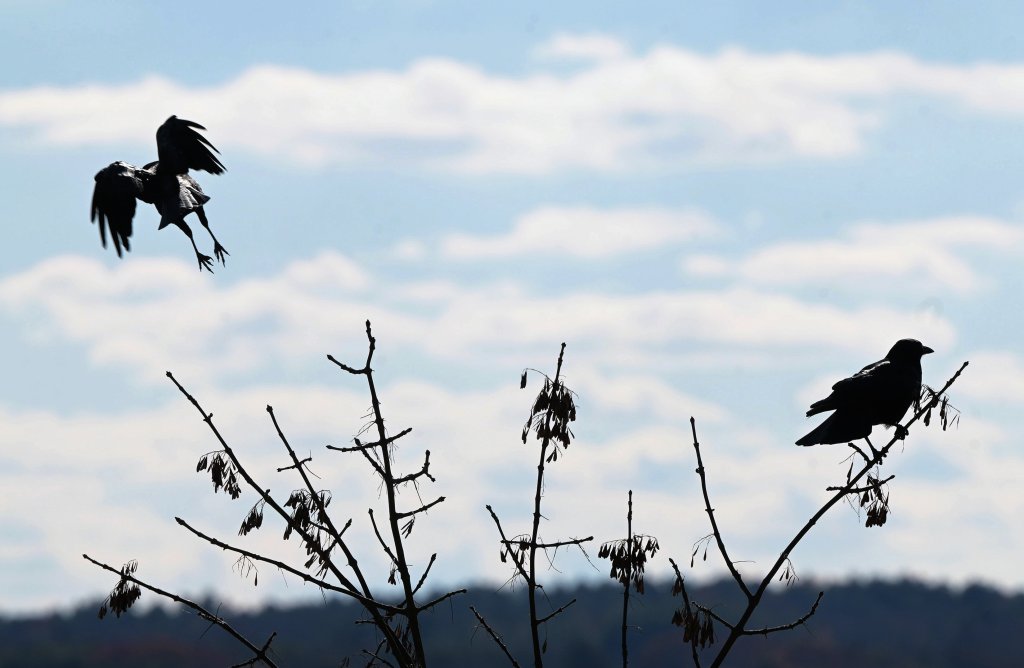
A crow recently found in Augusta tested positive for West Nile virus.
Steve Leach, the city’s health officer and deputy fire chief, said Maine Center for Disease Control and Prevention officials notified the city last week that a single dead crow had been found a few days earlier in someone’s yard on the east side of the Kennebec River.
West Nile virus spreads mostly through the bite of an infected mosquito. It can infect humans, horses, birds, and other animals, according to the Maine CDC.
Leach encouraged residents to make sure their properties are maintained in a way to prevent mosquitoes. People should get rid of any standing water, wear bug spray and avoiding being outdoors when mosquito activity is heavy.
Because it is mostly spread by mosquitoes, the disease spread is generally limited to warmer months when those insects are around. So the coming colder temperatures may help, until warmer weather returns in the spring.
“It’s a hard thing to say when a crow flies in from wherever and just happened to die in Augusta, whether it was actually contracted in Augusta. We have no idea,” Leach said Tuesday. “Any areas where mosquitos would live and breed are your areas of concern. The biggest thing is to be aware of mosquitoes, and if you find dead birds in your neighborhood, report them to us.”
What are the symptoms?
While many infected people may have no symptoms, others experience fever and flu-like illness. Severe symptoms can occur, including encephalitis, or brain swelling, and meningitis, or inflammation of the spinal cord. Anyone experiencing any of those symptoms is advised to call a health care provider, according to materials provided by Maine CDC.
Few people infected with it show signs and symptoms, which are generally mild and usually start three to 15 days after being bitten by an infected mosquito. This includes fever, head and body aches, weakness and vomiting. Most people who show mild signs and symptoms recover completely, but fatigue and weakness can last for weeks or months.
Rarely, people infected with the virus develop a severe illness affecting the brain and surrounding area. Signs and symptoms include high fever, headache, neck stiffness, confusion, coma and paralysis.
Severe illness can occur at any age, however people older than 60 have the highest risk.
People with certain medical conditions are also at greater risk. A small number of cases with severe illness die.
How to prevent West Nile virus?
The best way to prevent West Nile virus is to protect yourself and your family from mosquito bites. Ways to help do that, according to Maine CDC, include:
- Use an EPA-approved repellent for use on skin such as: DEET, oil of lemon, eucalyptus, IR 3535 or Picaridin.
- Wear long-sleeve shirts and pants when outside.
- Use permethrin on clothing.
- Get rid of places where mosquitoes can lay their eggs by draining standing water outside the house.
Standing water should be drained at least once a week. This includes buckets, pet bowls, and bird baths. You can also drill holes in things like tires and buckets that are left outside and can collect water. Additional prevention includes avoiding being outdoors at dawn and dusk when many mosquitoes are most active, and fixing holes in door and window screens.
What if I see a dead bird?
Leach said authorities generally recommend contacting the CDC if they see three or more birds dead, but said if residents see one dead bird and want to report it, that’s fine, too. Maine CDC may be reached at 800-821-5821.
As of mid-August, four wild birds in Maine — in Kennebec, Sagadahoc and York counties — have also tested positive for West Nile. Also, mosquitoes collected in Portland have tested positive for the virus this year.
Maine CDC tests wild birds during mosquito season to determine whether viruses are circulating in the state before they spread to humans and domesticated animals.
